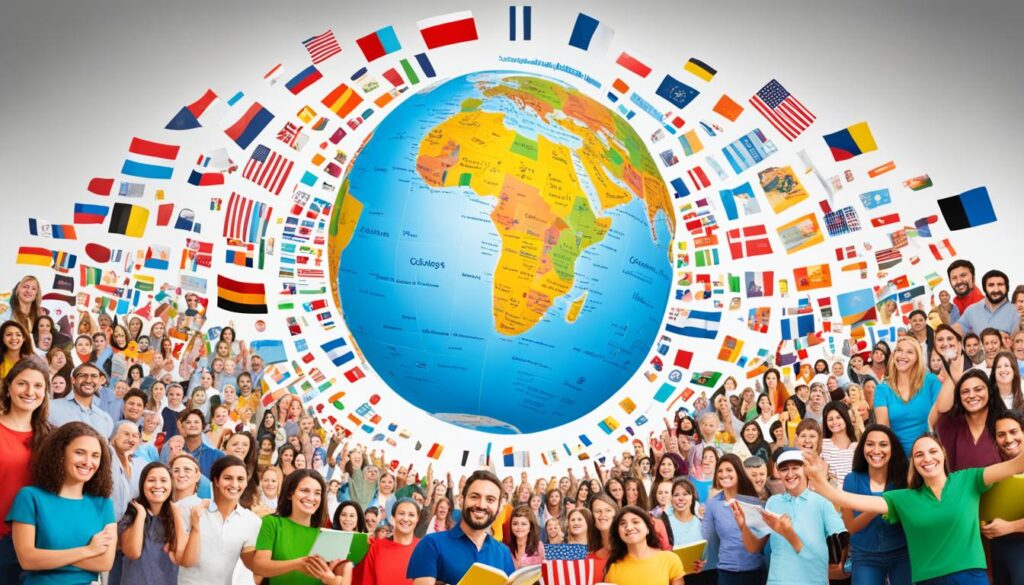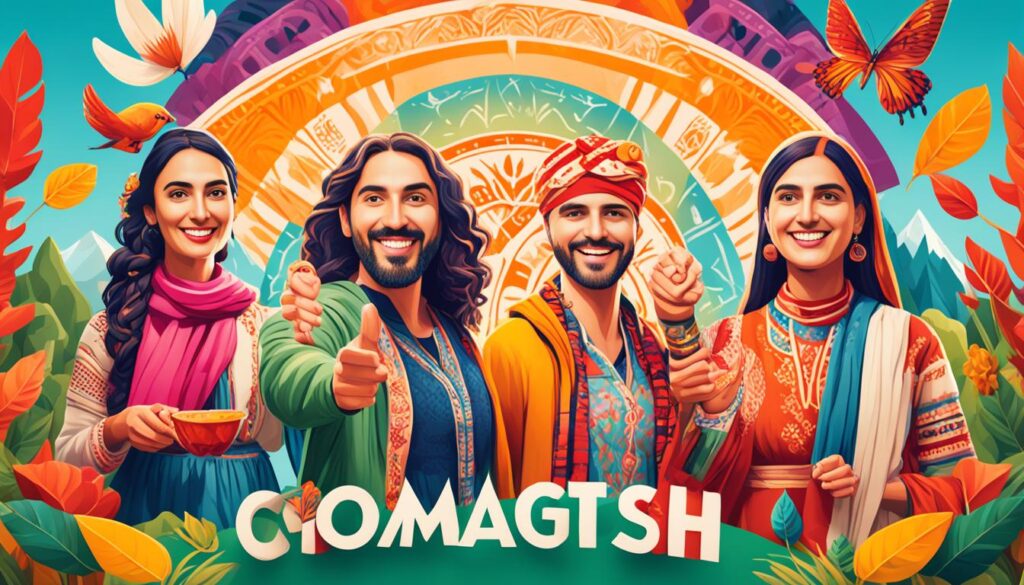In a world that is increasingly interconnected, the ability to communicate across linguistic boundaries has never been more critical. Multilingualism, the proficiency in multiple languages, is emerging as a key asset in global education. It plays a transformative role in language learning, shaping the way we learn, collaborate, and navigate the complexities of an interconnected world.
Key Takeaways:
- Language education programs provide a pathway for individuals to embark on a language education journey.
- There is a wide range of language learning resources, programs, and techniques available to enhance language acquisition.
- Language immersion programs offer a unique opportunity to immerse oneself in a new language and culture.
- Language proficiency development is a continuous journey that requires dedication and consistent practice.
- Bilingual education and foreign language learning contribute to the development of language skills and proficiency.
The Crucial Role of Multilingualism in Global Education
Multilingualism plays a crucial role in global education, offering a wide range of benefits to individuals and societies alike. Being multilingual provides cognitive benefits, such as enhanced problem-solving skills and improved memory retention. It also promotes cultural awareness and sensitivity, fostering empathy and understanding in a globalized world. In addition, multilingualism gives individuals a competitive edge in the job market, opening up diverse career opportunities and facilitating effective communication with stakeholders.
Cognitive Benefits of Being Multilingual
Being multilingual has numerous cognitive benefits. Studies have shown that multilingual individuals have enhanced problem-solving skills, as they are able to think and adapt to different linguistic structures and systems. They exhibit greater cognitive flexibility and creativity, enabling them to approach challenges from various perspectives. Moreover, the constant mental exercise involved in language switching and language planning improves memory retention and enhances overall cognitive function.
Enhanced Cultural Awareness and Sensitivity
Language is deeply intertwined with culture, and being multilingual allows individuals to develop a deeper understanding and appreciation of diverse cultures. By learning different languages, individuals gain insight into the customs, traditions, and values of other communities. This fosters cultural awareness and sensitivity, enabling individuals to navigate intercultural interactions with empathy and respect. Multilingualism promotes cross-cultural understanding and helps break down barriers between people from different linguistic backgrounds.
Building a Competitive Edge in the Job Market
In an increasingly globalized job market, multilingualism has become a highly sought-after skill. Companies value employees who can effectively communicate with international clients and colleagues. Being multilingual opens up a world of career opportunities, as it enables individuals to work in different regions and sectors where knowledge of multiple languages is crucial. Moreover, multilingual individuals are often perceived as adaptable, culturally competent, and open-minded, making them valuable assets in today’s diverse and interconnected workplaces.
| Cognitive Benefits | Cultural Awareness and Sensitivity | Job Market Advantage | |
|---|---|---|---|
| Enhanced Problem-Solving Skills | Being multilingual improves problem-solving abilities by promoting cognitive flexibility and creativity. | By understanding different languages, individuals gain a deeper appreciation and respect for diverse cultures. | Multilingualism gives individuals a competitive edge in the job market, opening up diverse career opportunities. |
| Improved Memory Retention | Constant language switching and planning improves memory retention and overall cognitive function. | Language learning fosters empathy and understanding, breaking down barriers between people from different linguistic backgrounds. | Multilingual individuals are perceived as adaptable, culturally competent, and open-minded, making them valuable assets in diverse workplaces. |
Language Education Journey: A Doorway to Diverse Opportunities
Embarking on a language education journey opens up a world of diverse opportunities. It enables individuals to engage in global collaboration and research, breaking down barriers and facilitating the exchange of knowledge. Language education also grants access to a broader knowledge base, allowing individuals to explore different academic resources, literature, and cultural artifacts.
Global collaboration and research thrive on effective communication across linguistic boundaries. By learning a new language, individuals can connect and collaborate with people from different cultures and backgrounds. This global collaboration not only enhances the learning process but also broadens perspectives and fosters a deeper understanding of diverse cultures.

In addition to global collaboration, language education provides access to a broader knowledge base. When individuals learn a new language, they gain the ability to explore academic resources, literature, and cultural artifacts from different parts of the world. This access to a wealth of knowledge expands their horizons and enriches their learning experience.
Language learning also opens doors to various opportunities, both personally and professionally. Whether it’s studying abroad, pursuing a career in international relations, or simply connecting with people from different backgrounds, language proficiency widens individuals’ scope of possibilities.
Overall, a language education journey equips individuals with the skills necessary to navigate an interconnected and globalized world. It enables them to engage in global collaboration, expand their knowledge base, and seize diverse opportunities for personal and professional growth.
Understanding and Appreciating Cultural Diversity Through Languages
Languages serve as a gateway to understanding and appreciating diverse cultures. As we navigate through a globalized world, language learning plays a crucial role in promoting empathy and tolerance. It provides us with the tools to navigate international settings with respect and understanding.
Promoting Empathy and Tolerance in a Globalized World
Language learning fosters empathy and tolerance by allowing us to engage with people from different cultures and backgrounds. When we learn a new language, we gain insights into the values, beliefs, and perspectives that shape different communities. Through this understanding, we can foster empathy and compassion, acknowledging the beauty and richness of cultural diversity.
Language Learning as a Vehicle for Cultural Exchange
Language learning serves as a powerful vehicle for cultural exchange. When we acquire a new language, we gain access to a deeper understanding of a culture’s history, traditions, and customs. This exchange goes beyond words and phrases; it opens up opportunities to engage with diverse communities, fostering mutual respect and appreciation.
| Benefits of Understanding and Appreciating Cultural Diversity Through Languages |
|---|
| Promotes empathy and tolerance |
| Fosters cross-cultural understanding |
| Enhances interpersonal communication skills |
| Expands global perspectives |
Multilingualism as a Catalyst for Cognitive Development
Multilingualism plays a significant role in cognitive development, offering a plethora of benefits beyond language proficiency. When individuals engage in language acquisition, they experience enhanced problem-solving skills, improved memory retention, and mental flexibility. The process of learning multiple languages stimulates the brain, promoting cognitive growth and creativity.
Enhanced Problem-Solving Skills Through Language Acquisition
Language acquisition exercises the brain’s problem-solving capabilities. Research has shown that the cognitive demands of learning and processing different languages enhance individuals’ ability to solve complex problems. Multilingual learners develop a unique set of cognitive strategies and mental flexibility, enabling them to approach challenges from multiple perspectives and find innovative solutions.
Memory Retention and Mental Flexibility Benefits
Learning and using multiple languages not only reinforces memory retention but also improves mental flexibility. Multilingual individuals have been found to have a better capacity for retaining and recalling information across different contexts and languages. This cognitive advantage extends beyond language-related tasks, benefiting overall learning and academic performance.
Preserving Linguistic Heritage: The Impact of Language Education Programs
Language education programs play a vital role in preserving linguistic heritage, supporting minority and endangered languages. These programs contribute to the revitalization of community identity, fostering a sense of pride and cultural continuity within communities.
Supporting Minority and Endangered Languages
Language education programs have a significant impact on supporting minority and endangered languages. By providing resources, curriculum, and instructional support, these programs ensure that linguistic diversity thrives and languages facing the risk of extinction are protected. By preserving and promoting these minority languages, we preserve the unique cultural traditions and knowledge embedded within them. This support is crucial for maintaining the linguistic fabric of communities and preserving their intrinsic heritage.
Revitalizing Community Identity Through Language
Language education programs also contribute to the revitalization of community identity. Language is a fundamental aspect of a community’s cultural heritage, and its preservation plays a vital role in strengthening the community’s sense of identity. By offering language education opportunities, these programs empower individuals to connect with their roots, fostering a deeper sense of belonging and pride in their community. Through language, communities can pass down traditions, stories, and values, ensuring the continuity and vitality of their cultural identity.

| Benefits of Language Education Programs | Examples |
|---|---|
| Preservation of minority and endangered languages | Supporting Indigenous language revitalization efforts |
| Development of intergenerational language transmission | Creating language learning resources for community members of all ages |
| Strengthening community bonds through shared language | Organizing language immersion events and cultural festivals |
| Promoting cultural diversity and inclusivity | Integrating diverse languages into school curricula |
| Enhancing community pride and identity | Recognizing languages as essential components of community heritage |
Fostering Inclusivity in Education with Language Immersion Programs
Language immersion programs play a significant role in fostering inclusivity in education by catering to diverse linguistic backgrounds. These programs create an environment where students can immerse themselves in a language and culture, leading to a deeper understanding and appreciation of different languages and traditions.
By providing equitable learning opportunities through native language instruction, language immersion programs ensure that all students have access to quality education regardless of their language proficiency. These programs embrace the diversity of students’ linguistic backgrounds and promote a sense of belonging and participation in the classroom.
Language immersion programs not only enhance students’ language skills but also foster cultural understanding and empathy. Students learn to navigate and communicate effectively in multicultural settings, promoting a more inclusive society.
Through language immersion programs, students develop a global mindset, enabling them to thrive in an interconnected world. They gain a deep appreciation for diversity and are equipped with the skills necessary to engage in meaningful cross-cultural interactions.
Empowering Students Globally with Language Proficiency Development
Language proficiency development plays a vital role in empowering students globally by enhancing their interpersonal and communication skills. When students engage in language learning, they acquire the strategies and tools necessary to become global citizens, fostering effective communication and promoting intercultural understanding.
Improving Interpersonal and Communication Skills
Developing language proficiency enables students to improve their interpersonal and communication skills. Through language learning, students gain the ability to express themselves effectively, both verbally and non-verbally, in different cultural contexts. This proficiency enhances their capacity to connect with others, build meaningful relationships, and collaborate across linguistic boundaries.
Moreover, language proficiency development cultivates active listening skills, allowing students to understand diverse perspectives and engage in constructive dialogue. Effective communication is a critical skill in various aspects of life, including academia, career, and personal relationships. By empowering students to improve their interpersonal and communication skills through language learning, we equip them with the tools they need to succeed in a globally interconnected world.
Language Learning Strategies for Global Citizenship
Language learning goes beyond the acquisition of vocabulary and grammar. It involves the development of language learning strategies that empower students to become global citizens. These strategies encompass not only linguistic proficiency but also intercultural competence, critical thinking, and empathy.
By employing language learning strategies, students gain the ability to navigate and understand diverse cultural practices, norms, and perspectives. They learn to appreciate and respect cultural differences, fostering a sense of global citizenship. This awareness and understanding enable students to actively engage with others, contributing to a more inclusive and interconnected society.
Language learning strategies also encourage students to embrace lifelong learning and adaptability. As languages evolve and global dynamics continue to change, these skills empower students to effectively communicate and navigate in an ever-changing world.
Ultimately, empowering students through language proficiency development prepares them to be active participants in global communities, ready to contribute positively and advocate for a more inclusive and interconnected world.

Leveraging Language Learning Resources and Techniques for Success
Effective language learning requires the utilization of various resources and techniques that cater to different learning styles and preferences. By incorporating language learning materials into the curriculum, educators can enhance the learning experience and promote active engagement among students.
One valuable resource is the use of multimedia tools, such as videos, podcasts, and interactive online platforms, which offer authentic language input and real-world contexts. These resources not only expose students to different accents and cultural nuances but also provide opportunities for listening and speaking practice.
Another effective technique is the integration of language learning activities into everyday classroom tasks and projects. This approach allows students to apply their language skills in practical situations, fostering their communication abilities and reinforcing their language acquisition process.

Translanguaging, a pedagogical approach that acknowledges and validates students’ entire linguistic repertoire, is another powerful tool that promotes language empowerment and equity in the classroom. By creating a learning environment that encourages the blending of languages, dialects, and communication practices, translanguaging allows students to leverage their existing language skills, build upon their strengths, and bridge language gaps.
Through translanguaging, students develop a deeper understanding of language structures, enhance their language proficiency, and gain confidence in their language abilities. It also fosters inclusivity by valuing and respecting the diverse linguistic backgrounds of students, creating a space where all voices are heard and valued.
By leveraging a variety of language learning resources and techniques, incorporating language learning materials into the curriculum, and embracing translanguaging, educators can empower students in their language learning journey, foster equitable language education, and promote the development of language skills for success in a globalized world.
Conclusion
Multilingualism plays a pivotal role in shaping our society and fostering a more interconnected world. The contributions of multilingualism are endless, as it enhances cultural understanding, promotes inclusivity, and opens up diverse opportunities. By embracing multilingualism, we not only enrich our personal lives but also contribute to the advancement of the language education journey on a global scale.
The transformative power of multilingualism lies in its ability to bridge linguistic and cultural gaps. Through language education, we can foster cultural understanding and appreciation, breaking down barriers and promoting empathy in an increasingly interconnected world. Multilingualism enables us to navigate global collaborations with ease and engage in meaningful dialogue, connecting with individuals from different backgrounds and perspectives.
As individuals, we have a crucial role to play in advancing the language education journey. By recognizing the value of multilingualism and actively engaging in language learning, we contribute to building a more inclusive and interconnected society. Our efforts in developing language proficiency not only empower us personally but also equip us with the necessary skills to thrive academically and professionally in a globalized world.
In conclusion, multilingualism continues to shape and transform our society in profound ways. By embracing multilingualism and recognizing its endless contributions to society, we become active participants in the advancement of the language education journey. Let us continue to foster cultural understanding, promote inclusivity, and open up diverse opportunities by embracing the power of multilingualism in our lives.
FAQ
What are the cognitive benefits of being multilingual?
Being multilingual enhances problem-solving skills and improves memory retention.
How does multilingualism promote cultural awareness and sensitivity?
Multilingualism fosters empathy and understanding in a globalized world, allowing individuals to navigate international settings with respect and understanding.
What advantages does multilingualism provide in the job market?
Multilingual individuals have a competitive edge in the job market, opening up diverse career opportunities and facilitating effective communication with stakeholders.
How does language education open up diverse opportunities?
Language education enables individuals to engage in global collaboration and research, breaking down barriers and facilitating the exchange of knowledge.
How does language learning promote empathy and tolerance?
Language learning fosters empathy and tolerance in a globalized world, enabling individuals to understand and appreciate diverse cultures.
How does language learning contribute to cognitive development?
Language learning stimulates the brain, enhancing problem-solving skills and promoting mental flexibility and creativity.
How do language education programs support minority and endangered languages?
Language education programs play a vital role in preserving linguistic heritage and revitalizing community identity, supporting minority and endangered languages.
How do language immersion programs foster inclusivity in education?
Language immersion programs cater to diverse linguistic backgrounds, providing equitable learning opportunities through native language instruction.
How does language proficiency development empower students?
Language proficiency development improves interpersonal and communication skills, enabling students to become global citizens and promoting intercultural understanding.
What are the resources and techniques for effective language learning?
Incorporating language learning materials into the curriculum and utilizing translanguaging techniques empower language learners and promote language equity.
What contributions does multilingualism make to society?
Multilingualism fosters cultural understanding, promotes inclusivity, and opens up diverse opportunities in society.
What is our role in advancing the language education journey?
As individuals, we play a crucial role in embracing multilingualism and recognizing its transformative power in personal, academic, and professional growth.
Source Links
- https://www.linkedin.com/pulse/breaking-barriers-transformative-impact-global-education-dey-rywmc?trk=article-ssr-frontend-pulse_more-articles_related-content-card
- https://www.harrowschool.hk/embracing-multilingualism-the-benefits-of-language-learning-in-an-international-school/
- https://medium.com/@msclerge/breaking-language-barriers-the-transformative-power-of-translanguaging-in-education-00f3ba52ca32

